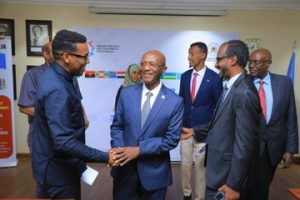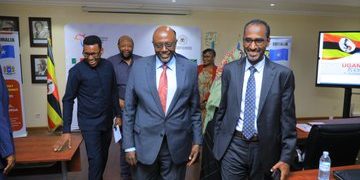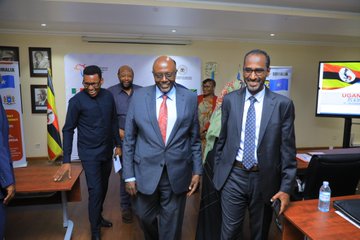Uganda and Somalia are poised to expand trade, education, and labour cooperation as officials from both countries prepare for the 2nd Uganda–Somalia Joint Permanent Commission (JPC), Investment and Business Summit scheduled for 7–8 October 2025 at Mestil Hotel, Kampala.
Speaking at the media launch at Uganda’s Ministry of Foreign Affairs headquarters on Wednesday, top diplomats from both governments underscored the summit’s role in unlocking economic opportunities and strengthening bilateral relations.
Trade: Tapping into New Markets
Ambassador Richard Kabonero, Head of Regional Economic Cooperation at the Ministry of Foreign Affairs, said Uganda is prioritising markets, investors, and tourists under its new Economic & Commercial Diplomacy Strategy.
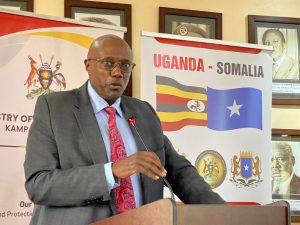
“The Uganda–Somalia JPC & Investment Summit is a platform to boost awareness of trade and investment opportunities between our two countries,” Kabonero said. “In the last 15 years, Uganda has expanded its manufacturing base, adding 31 new products. Somalia and the wider region are primary markets for these goods because of shared tastes, easier logistics, and regional integration.”
He also cited the Uganda Airlines route to Mogadishu as a critical trade and cargo linkage but acknowledged it faces cargo space constraints that need addressing to realise its full potential.
H.E. Prof. Sam Tulya-Muhika, Uganda’s Ambassador to Somalia, emphasised the need for Ugandan businesses to be more aggressive in tapping into Somalia’s growing market.
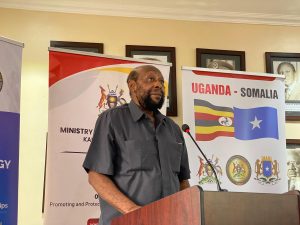
“Trade flows are currently one-sided,” he said. “Somalis are trading heavily in Uganda, but our businesses have limited presence in Somalia. We must overcome our fear of taking risks and seize these opportunities. Those who take the risk when the situation is challenging will reap the highest rewards.”
He revealed that the summit would flag off new exports to Somalia, including Ugandan fruits and other agricultural products, and pave the way for regular trade flows.
From the Somali side, Deputy Ambassador Abdelatif Ali welcomed Uganda’s efforts to expand economic cooperation.
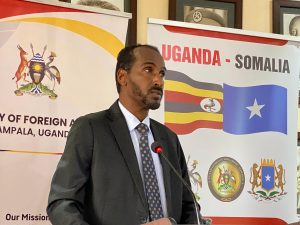
“Somalia’s business community is preparing to attend the Investment & Business Summit alongside Ugandan investors,” Ali said. “We have ready markets for Ugandan agricultural products such as pineapples and avocado, and the MOUs on trade, immigration, labour, and education will provide a roadmap for deeper cooperation.”
Education: Building Human Capital and Goodwill
Education also played a prominent role at the launch, with Uganda positioning itself as a regional hub for quality education.
“Uganda has a competitive advantage in education,” Ambassador Kabonero noted. “We intend to showcase our schools, universities, and training institutions to Somali stakeholders during the summit. Strengthening education cooperation will not only build skills but also foster goodwill, as former students often become business and political leaders.”

Ambassador Tulya-Muhika confirmed that a new MOU on Education & Sports will be signed to formalise existing cooperation. “Somali students already train in Ugandan institutions,” he said. “This agreement will ensure structured academic exchanges and tangible results, rather than just signing documents without implementation.”
Ali reiterated Somalia’s commitment, saying, “Education is central to our human capital development agenda. The MOU will help increase Somali student enrollment in Uganda and strengthen academic collaboration.”
Uganda Diaspora in Somalia: Protecting Rights, Expanding Opportunities
Speakers also addressed the large Ugandan diaspora in Somalia, many of whom work as teachers, doctors, lecturers, and in the security sector.
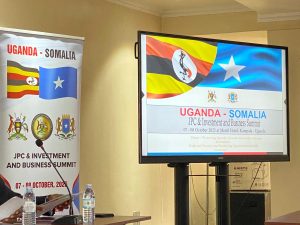
Ambassador Kabonero stated that their contribution to bilateral relations was significant and called for stronger economic ties to benefit both Ugandans in Somalia and Somalis in Uganda.
Ambassador Tulya-Muhika revealed that a Bilateral Labour Agreement would be signed to protect the rights of Ugandan workers in Somalia. “Some Ugandans face labour challenges because of differing legal and economic systems,” he said. “This agreement will safeguard their interests and ensure decent working conditions.”
Amb. Maj Gen (Rtd) Mugisha Nathan, Deputy Head of Mission in Mogadishu, urged Ugandans to overcome their fear of working in Somalia.
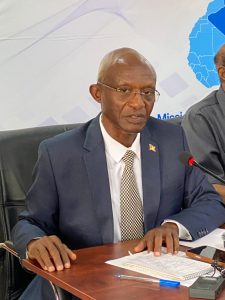
“We have over 3,000 Ugandans already working in Somalia in various sectors, including education, health, aviation, and security,” he said. “Kenyans and other nationalities are taking advantage of these opportunities. Ugandans should not be left behind.”
He added that while military efforts had brought stability, the long-term solution lay in economic investment and job creation.“People need to feel a sense of belonging through jobs and business opportunities. That is what will bring lasting peace and prosperity,” Mugisha stressed.
With the summit just weeks away, both governments expressed optimism that the new agreements on trade, education, and labour cooperation will transform bilateral relations and unlock sustainable economic growth for Uganda, Somalia, and the wider region.
